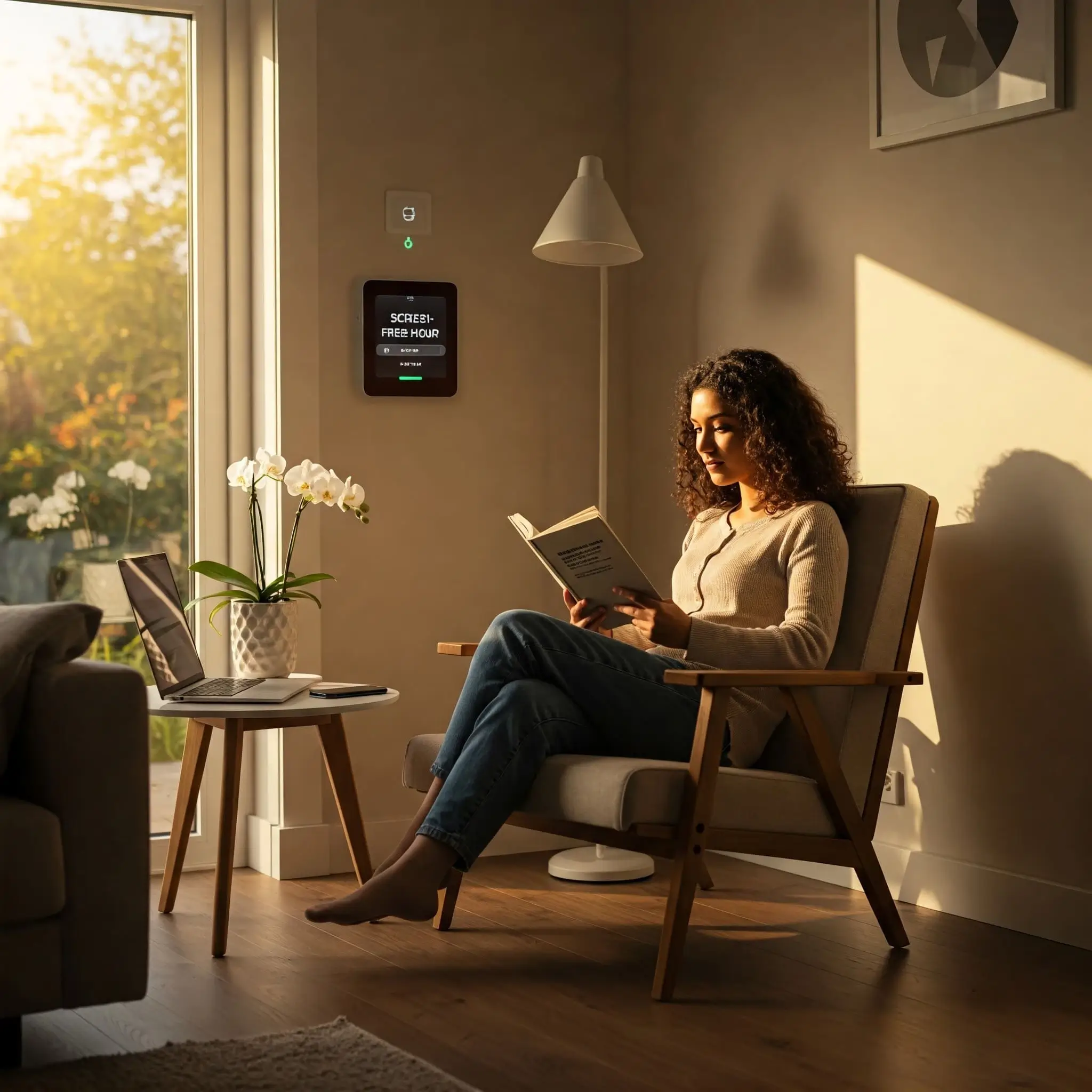1. Introduction
- The digital world has become an inseparable part of our daily lives, but excessive screen time not only affects our well-being but also contributes to high energy consumption. Digital devices such as smartphones, laptops, and televisions consume electricity, and their prolonged use increases the carbon footprint. Reducing online time through a digital detox can save energy, lower electricity bills, and promote a healthier lifestyle.
2. The Energy Impact of Excessive Digital Usage
Device Power Consumption: Smartphones, computers, and gaming consoles constantly draw power, even when idle.
Internet Infrastructure Energy Use: Data centers and servers require vast amounts of electricity to function.
Phantom Energy Drain: Many devices consume electricity even in standby mode.
Increased E-Waste Production: Frequent upgrades lead to electronic waste and environmental harm.
Rising Household Electricity Bills: The more time spent online, the higher the energy costs.
3. Understanding a Digital Detox
Definition: A conscious decision to reduce digital consumption.
Types of Detox: Short breaks, designated offline days, or long-term digital minimalism.
Physical and Mental Health Benefits: Less screen time leads to reduced eye strain, stress, and improved sleep.
Environmental Benefits: Less energy usage reduces carbon emissions.
Boost in Productivity: Less online distraction enhances focus and efficiency.
4. Setting Digital Boundaries to Reduce Screen Time
Establish Screen-Free Zones: No devices in bedrooms and dining areas.
Use App Timers: Set limits on social media and entertainment apps.
Unplug Devices When Not in Use: Prevent phantom energy loss.
Turn Off Notifications: Reduce constant digital engagement.
Allocate Time for Offline Activities: Reading, exercise, or hobbies instead of screen time.
5. Reducing Streaming and Online Entertainment Energy Use
Lower Video Streaming Quality: HD and 4K use more energy than standard resolution.
Download Instead of Streaming: Watching offline reduces internet bandwidth usage.
Limit Background Streaming: Avoid leaving videos or music playing when not actively engaged.
Use Energy-Efficient Devices: Opt for smart TVs with eco-modes and LED screens.
Schedule Screen-Free Entertainment: Engage in board games, outdoor activities, or in-person socializing.
6. Managing Internet Browsing for Energy Efficiency
Use Dark Mode: Reduces power consumption on OLED screens.
Close Unused Tabs and Apps: Prevents excessive CPU and battery drain.
Limit Cloud Storage Syncing: Frequent syncing increases energy use.
Use Energy-Efficient Browsers: Some browsers are optimized for lower power consumption.
Turn Off Auto-Play Videos: Stops unnecessary data usage and saves electricity.
7. Smart Scheduling for Device Usage
Set Screen Time Limits: Use built-in phone settings for daily limits.
Create a Digital Routine: Schedule fixed hours for checking emails and browsing.
Batch Tasks: Combine online tasks to reduce repetitive device usage.
Use Sleep Mode & Energy Saver: Extend battery life and minimize energy use.
Plan Offline Work Periods: Work on documents offline before connecting to the internet.
8. Reducing Social Media Dependency
Unfollow Unnecessary Accounts: Reduce distractions and excessive scrolling.
Use a Social Media Timer: Prevent mindless scrolling beyond set limits.
Turn Off Auto-Refresh Features: Minimizes constant data and battery drain.
Engage in Offline Conversations: Prioritize in-person interactions over digital ones.
Limit Device Carrying Time: Keep your phone away during meals and social outings.
9. Optimizing Email and Work Communication
Unsubscribe from Unnecessary Emails: Reduces inbox clutter and server load.
Batch Email Checking: Check emails 2-3 times a day instead of constantly.
Use Offline Document Editing: Avoid cloud-based editing for minor tasks.
Reduce Video Calls: Opt for audio calls when video isn’t necessary.
Optimize File Sizes: Compress attachments and avoid unnecessary large downloads.
10. Sustainable Gaming and Online Entertainment
Play Energy-Efficient Games: Less graphically intense games use less power.
Use Auto-Shutdown Features: Set consoles and PCs to turn off after inactivity.
Limit Online Multiplayer Sessions: Offline modes consume less energy.
Charge Controllers and Devices Efficiently: Avoid overcharging.
Use Console Energy-Saving Modes: Optimize gaming device settings for lower consumption.
11. Reducing Smart Device Dependency
Limit Smart Assistant Use: Devices like Alexa and Google Home constantly use standby power.
Turn Off Voice Assistants When Not Needed: Avoid continuous background listening.
Use Smart Plugs: Automate energy-efficient device use.
Disable Auto-Update Features: Prevent unnecessary data syncing.
Manually Control Smart Lighting & Appliances: Reduce dependency on voice-activated controls.
12. Using Digital Detox Apps to Track Usage
Install Usage Tracking Apps: Apps like RescueTime and Forest monitor screen time.
Analyze Your Digital Habits: Identify high-energy-consuming activities.
Set Digital Detox Goals: Define daily or weekly screen-free hours.
Enable App Restrictions: Block distracting apps during work hours.
Use Reward-Based Detox Programs: Some apps offer incentives for reduced usage.
13. Comparison Table: Digital Habits and Energy Savings
| Digital Habit | Energy Consumption | Potential Savings | Best Alternative |
| Streaming HD Content | High | 30% energy reduction | Watch in SD/Download |
| Unnecessary Email Checking | Moderate | 15% savings on workload | Batch email reading |
| Leaving Devices on Standby | High | 10-15% lower bills | Unplug when not needed |
| Social Media Overuse | Moderate | 20% better productivity | Offline interactions |
| 24/7 Cloud Syncing | High | 25% energy efficiency | Manual sync settings |
14. Conclusion
Reducing digital consumption through a digital detox not only improves mental and physical well-being but also significantly decreases energy consumption. By setting boundaries, optimizing online habits, and embracing offline activities, individuals can contribute to a more sustainable lifestyle. Small steps, such as unplugging devices, using energy-efficient apps, and limiting streaming time, can have a big impact on energy savings and carbon footprint reduction.
Disclaimers
Energy savings may vary depending on device type and usage patterns.
Some features require specific settings or applications for optimal efficiency.
The effectiveness of digital detox strategies differs from person to person.
Smart device power consumption varies by model and manufacturer.
Comparison data is based on general research and may change with technological advancements.
Author: Dipika Kumari
Publication Date: 27-03-2025
Email: [email protected]
